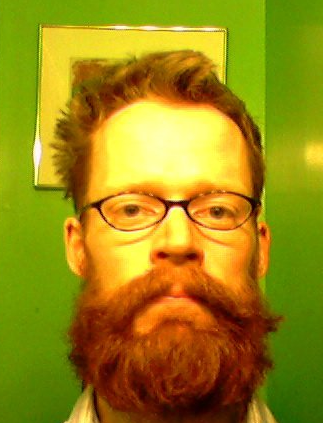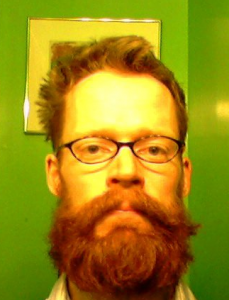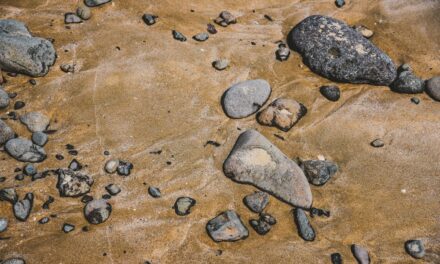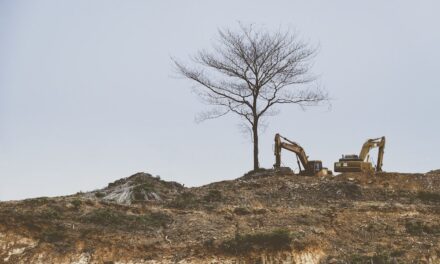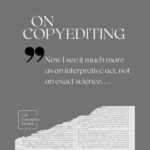CR staff member Dietrik Vanderhill is Dutch. Like, wore-wooden-shoes-to-hometown-parades-in-Iowa Dutch. Like, grew-up-in-a-house-his-father-built-himself Dutch. Like, every-angle-on-his-body-is-precisely-90-degrees Dutch. You could set your watch on the man’s chin were in not covered by a large, bushy beard the color of fall leaves.
Last Monday, Dietrik came into our office in a state of severe agitation. He was struggling to come up with a way to describe why, exactly, Craig Davidson’s “The Burn” (from our current issue) was so compelling a story. Then Dietrik started plucking individual hairs from his beard and shaping them into letters, which he then glued to scrap paper. The following is a transcription of his wiry red missive.
Dietrik Vanderhill: For this post, I’m tempted to write a recommendation for “The Current State of the Universe,” winner of the Robert and Adele Schiff Award in Prose (in the latest issue of CR). This romping story by Theodore Wheeler follows one employee of a company called Make Things Right, Inc., a sort of karmic revenge business. The whole story is framed as a lecture by James Dandrow (the narrator) to a new recruit:
It’s simple. You cut someone off in traffic, flip him the bird, and in the morning the gate is open and your dog has run away. It isn’t a coincidence. It’s us. We’re the Furies of the modern world—the vengeance of a god gone corporate. . . . A big part of this job is having faith that the world is better because of us, that we must sometimes act against humanity in order to preserve a state of equilibrium. But occasionally a case goes so obviously wrong that it calls the whole system into question.
But a story with passages like this—along with such a provocative concept—can easily sell itself. It provides a direct, satisfying approach to “fixing” the world’s ills, albeit on a small scale. Yet while James Dandrow discovers that pumping more malice into the system isn’t the answer all of the time (only most of the time), another story in this Cincinnati Review issue probes a bit deeper into similar territory.
Why are we attracted to destruction? “The Burn” by Craig Davidson tries to answer that. The story finds our narrator, a 23-year-old soldier discharged from the Marines after being deployed in Iraq, trying to readjust to civilian life while driving a school bus in Niagara Falls. Sections jump among three story lines: the narrator’s time in Iraq, his immediate return to the States, and his current bus-driving life. The lack of smooth transitions heightens the contrast of these juxtaposed worlds. More serious in tone than Wheeler’s, Davidson’s story gives us evils that cannot be avenged with tasteful, light vandalism. A teenage girl’s body and spirit are disfigured by cancer; an undiscovered landmine explodes a military latrine truck and dismembers its driver; a camel spider decapitates a mouse; Occidental Chemical insidiously dumps toxic waste into the Niagara. Over the course of the story, the narrator distills these miseries down to their elements (sometimes down to sentence fragments) as he, along with his bunk mate Merryweather, experience war at the microscopic level. He puzzles over why a spider is “just full of goo, like some carnivorous bath bead,” and he fights the hours of heat and tedium in the desert: “Sweat pooling in my eye sockets. Checkpoint 86K. A cement pillbox bordering a bone-white road. That was my home for eleven months.”
Do not expect this narrator to give you a contextual overview of the Middle East or offer the lens of military analysis. Instead, he conveys his world in the precise, palpable details that inspire both surprise and dread. The characters’ motivations reveal themselves piecemeal as the narrator seeks out a complex friendship with one of the students riding his bus, Bree (the daughter of a Gulf War vet, Cedric), because he recognizes that Bree chases the “burn” of a life with cancer in the same way that Merryweather was “chasing the burn,” or the inevitability of destruction, in Iraq.
So why are these soldiers (and by extension, the rest of us) drawn to destruction? “The Burn” asks us to think harder before driving toward it, especially when it seems like the only direction to go.

